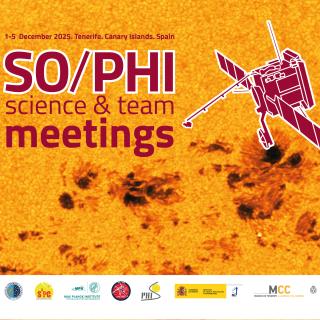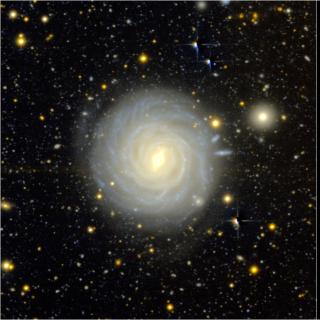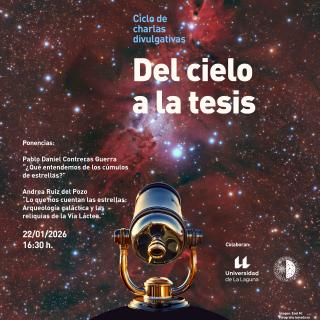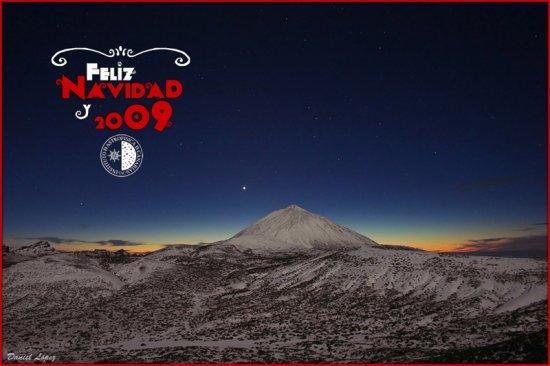It may interest you
-
 From today until 5 December 2025, the Instituto de Astrofísica de Canarias (IAC) is hosting the SO/PHI Science and Team Meetings, an international gathering focused on the scientific and technical advances of the Polarimetric and Helioseismic Imager (PHI) instrument aboard ESA's Solar Orbiter (SO) space mission. The development of PHI was co-led by the Spanish Space Solar Physics Consortium (S3PC), which also currently coordinates its scientific operation and exploitation. The IAC is part of this network. PHI is a high-precision solar observation instrument equipped with two telescopes—oneAdvertised on
From today until 5 December 2025, the Instituto de Astrofísica de Canarias (IAC) is hosting the SO/PHI Science and Team Meetings, an international gathering focused on the scientific and technical advances of the Polarimetric and Helioseismic Imager (PHI) instrument aboard ESA's Solar Orbiter (SO) space mission. The development of PHI was co-led by the Spanish Space Solar Physics Consortium (S3PC), which also currently coordinates its scientific operation and exploitation. The IAC is part of this network. PHI is a high-precision solar observation instrument equipped with two telescopes—oneAdvertised on -
 A new study published in Astronomy & Astrophysics unveils a powerful way to determine the size of dark matter haloes—the massive, invisible structures that host galaxies—by simply measuring how large galaxies appear in deep astronomical images. Researchers Ignacio Trujillo and Claudio Dalla Vecchia, from the Instituto de Astrofísica de Canarias (IAC) and the Universidad de La Laguna (ULL), demonstrate that galaxy size can serve as a precise proxy for halo size, offering measurements up to six times more accurate than previous methods. Using the cutting-edge EAGLE cosmological simulationsAdvertised on
A new study published in Astronomy & Astrophysics unveils a powerful way to determine the size of dark matter haloes—the massive, invisible structures that host galaxies—by simply measuring how large galaxies appear in deep astronomical images. Researchers Ignacio Trujillo and Claudio Dalla Vecchia, from the Instituto de Astrofísica de Canarias (IAC) and the Universidad de La Laguna (ULL), demonstrate that galaxy size can serve as a precise proxy for halo size, offering measurements up to six times more accurate than previous methods. Using the cutting-edge EAGLE cosmological simulationsAdvertised on -
 El ciclo de charlas divulgativas Del Cielo a la Tesis, impulsado por el estudiantado predoctoral del Instituto de Astrofísica de Canarias (IAC) y la Universidad de La Laguna (ULL) para acercar la investigación en astrofísica a la ciudadanía, celebrará una nueva sesión el próximo 22 de enero de 2026 a las 16:30 horas en el Museo de la Ciencia y el Cosmos, del Organismo Autónomo de Museos y Centros del Cabildo de Tenerife. En esta ocasión, la cita propone un viaje al pasado de nuestra galaxia a través de dos ponencias que abordan cómo se forman y evolucionan los cúmulos de estrellas y cómo lasAdvertised on
El ciclo de charlas divulgativas Del Cielo a la Tesis, impulsado por el estudiantado predoctoral del Instituto de Astrofísica de Canarias (IAC) y la Universidad de La Laguna (ULL) para acercar la investigación en astrofísica a la ciudadanía, celebrará una nueva sesión el próximo 22 de enero de 2026 a las 16:30 horas en el Museo de la Ciencia y el Cosmos, del Organismo Autónomo de Museos y Centros del Cabildo de Tenerife. En esta ocasión, la cita propone un viaje al pasado de nuestra galaxia a través de dos ponencias que abordan cómo se forman y evolucionan los cúmulos de estrellas y cómo lasAdvertised on
